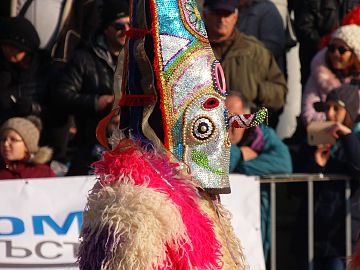Surwa

The Surwa ( Bulgarian сурва) is a Bulgarian folk festival that celebrates the beginning of the new calendar year and is represented in all ethnic areas of the country - sometimes under different names. The ritual mask play is about driving out evil spirits and forces from the old year and asking for fertility, good harvests, health and life in the coming year.
In 2015 Surwa became part of the intangible UNESCO World Heritage Site .
Rituals and Procedure
The moves take place in the first few weeks of the year. Disguised groups of mainly men move through the streets and symbolize with their disguises the eviction of ghosts and New Year's wishes in the family and in agriculture. Accompanied the performances of musicians with different Bulgarian folklore instruments, including the violin often like gadulka , the bagpipe Gajda , the cylinder drum Tapan and Kegeloboe zurna . The Bulgarian folk dance Horo is part of every traditional festival, including the Surwa.
Typical of a Surva are the most terrible and creepy-looking masks with which evil spirits and forces are to be expelled from the New Year, including the Kambani ( Bulgarian камбана ; plural Kambani , камбани; in German: bells) or Tschanowe ( Bulgarian чанове) ; Singular Tschan, чан), which are tied around the waist of the mask wearer in many ways and which make a lot of noise during ritual dancing. To the music of drums and folk instruments as well as the ringing of hundreds of bells, the group of players advances at a specific rhythmic pace.
With their representation, the groups almost always tell a story, with many groups of people from the Bulgarian people being exaggerated. At the wedding, traditional for the western Bulgarian Surwakari , the bride is always played by a disguised man. The Zaorawane ( Bulgarian заораване ; German: beginning of plowing) is typical of the “Kukeri” . Another common image is the taming of a bear, in which a person disguised as a bear is led on a chain.
Disguise
The costumes are either mainly made of leather or fur, or consist of many smaller rags and rags. In the Pernik region, the masks are made from the skin and fur of sheep and goats, feathers and wings of various birds, horns, corn leaves and hemp. Other Bulgarian folklore areas make excellent use of cloth, woolen thread, pearls, as well as dried and paper plants.
All masks and costume components are made by hand by the participants and masters of the village as part of the ritual in a lengthy and laborious process, with secrecy from outsiders.
Picture gallery
The International Mascarade Games "Surwa" in Pernik
The Surwa International Festival of the Mascarade Games in Pernik is the largest mask game in Bulgaria and on the Balkan Peninsula, and one of the largest representations of traditional folk games and customs with masks in Europe and the world. The festival is held with the purpose of promoting variants of the ancient bachelorette rites that are part of Bulgarian folklore traditions. With its competitive nature , it is both the meeting point and bankruptcy of their living porters, best known under the names Surwakar ( Bulgarian сурвакар ; plural Surwakari , сурвакари) and Kuker ( Bulgarian кукер ; plural Kukeri , кукери). The Surwa in Pernik is held every year on the last Friday, Saturday and Sunday in January, the highlight being the two-day pageant of Bulgarian and foreign groups on Saturday and Sunday.
Traditionally around 6000 people take part in over 100 masquerade groups from all ethnographic regions of Bulgaria and guests from Europe, Asia and Africa. The participants come to Pernik to compete with each other, for the recognition of being a part of this ancient amusement, while the spectators from all over Bulgaria and the world enjoy the magic of the game, come to see and touch the masks, on the extensive Take part in the fringe program about history and mask making and wish each other good health and happiness.
With the participation of the New Bulgarian University and the Institute of Folklore, a scientific conference dedicated to masks and masks will be organized at the Bulgarian Academy of Sciences as part of the festival. The conference is attended by well-known Bulgarian folklorists, ethnologists, anthropologists and representatives from various universities and institutes.
The festival started in 1965 when Jordan Nikolov, a civil servant in the District Council for Culture, suggested that a National Festival be held in Pernik and that the masquerade groups of all ethnic groups in Bulgaria be presented. In 1966 the municipality of Pernik organized the festival for the first time. Since 1985 groups from abroad have also participated. For 2009, Pernik was declared the European Capital of Masquerade Traditions by the President of the Association of European Carnival Cities.
In 2017 the festival took place for the 26th time in Pernik.
Similar festivals in the Balkans
Other countries on the Balkan Peninsula also carry out similar traditions around the turn of the year. In Romania, a masquerade called "Capra" (goat) is common, in which a person with a goat mask is the focus.
literature
- Kalina Bakalova: Kukeri: Ritual Performances in Bulgaria. (PhD dissertation) University of Georgia, Athens, Georgia 2009
- Christo Vakarelski: Bulgarian folklore. De Gruyter, Berlin 1969, p. 324, 380-389, ISBN 3-11-000266-3
- Clare Ward, Nicole Rode, Marei Hacke, Judy Rudoe: A Bulgarian kukeri mask: a diplomatic gift and the conservation of its polyurethane foam decorations. In: The British Museum. Technical Research Bulletin, Vol. 7, 2013, pp. 31-40
Web links
- public-republic.de, kukeri-part-of-the-living-heritage-bulgaria
- Кукери от гр. Ямбол в Симитли 01/16/2016. Youtube video
- http://pernik.bg/p/yanakieva-trzhestveno-zapali-festivalniya-ogn-i-dade
- http://www.surva.org/
- http://romaniatourism.com/traditions-folklore.html






